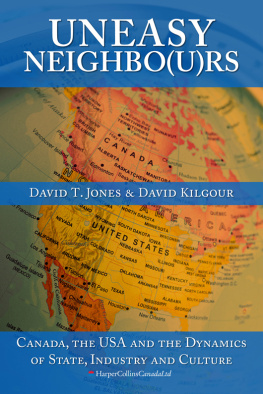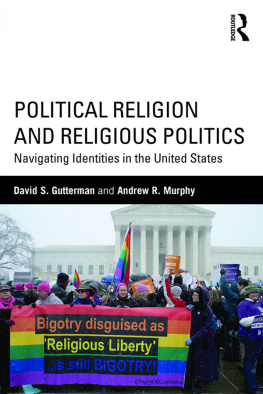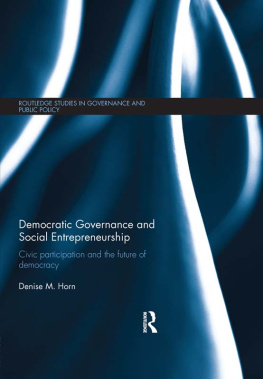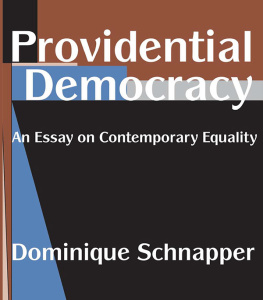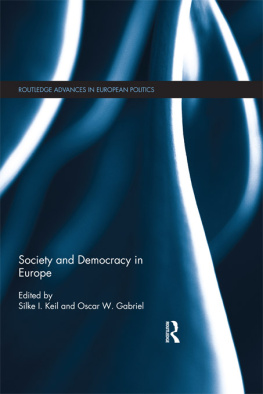To Teresa Chin Jones
When a man receives an honor in Washington, the tradition is to offer a salutation
to my wife as my strongest supporterand my severest critic. But for me, when I
needed a severest critic, my wife has always remained my strongest supporter.
and
To Laura, Eileen, Margot, Dave, Hilary, and Tierra
Relations between Canada and the United States, although close and complex, are the subject of academic and press interpretation that sharply varies. One interpretation is that under the weight of proximity and a one-to-ten disparity in GDP and population size, the smaller partner, Canada, is succumbing to American values and political domination. In that view, Canada in its institutions and policies is becoming more like the United States; the very identity of Canada is in jeopardy. Inadvertently, according to such claims, Canadian culture is disappearing and with it the capacity of Canada to act autonomously.
Another interpretation is that globalization is causing these two countries to converge in outlook and value, not asymmetrically towards that of the United States, but mutually and equally in the direction of some global norm for rich, advanced-industrial democracies in which the multinational corporation and common political interests tend to drive these polities towards a market-determined sameness. Just as the North American car industry is no longer exclusively U.S. and Canadian, the distinctiveness and power of the nation-state is everywhere in decline.
A third interpretation, heard more frequently in the United States than in Canada, is that the two polities are actually diverging in social value, in ideological preference, and in outlook towards world politics. While the United States, for example, attempts to escalate the war against drugs in Colombia and Mexico, Canada decriminalizes marijuana use at home. While the United States pursues a vigorous policy of democratization in Iraq, Canada places its priority on the establishment of an International Criminal Court. According to this third interpretation, the two governments and societies are moving in opposite directions.
In contrast, the authors of this book hold a very different view. They believe that for reasons of history, geopolitics, and culture, Canada and the United States are different and always will be. Kilgour and Jones see neither long-term convergence nor divergence. Nor do they see two polities at odds with each other over fundamental matters of foreign policy. For them, Canada and the United States represent alternative Americas, different yet compatible. For them, two visions of what North America is and ought to become is a salubrious expression of what democracy itself is in a modern, free, multi-party state. For these authors, opportunity, not negativism or ill-will, is the most remarkable attribute of Canada-U.S. relations.
What these authors bring to the discussion of Canada-U.S. relations is freshness and sanity. Their assessments, while frequently irreverent, are plausible and quite balanced. They draw upon their own long experience in the two respective governments to reveal both their confidence in the democratic process and their occasional frustration at its outcomes.
Their approach is to present a Canadian or an American assessment and then to bounce counter-responses off against that assessment. In approach, the analysis is a type of dialectic that eventually reaches synthesis. By no means does either author act as an official spokesman for the government with which he has been affiliated. Each is something of a maverick. Each is independent of conventional political labels.
There is a place for this type of book, written openly, by actors who have been on the inside of government. Signifying much of the best impulse in North America, this book reflects well upon the citizens of each polity and upon their largely successful effort to hold their respective governments accountable in an interrelationship that works.
Dr. Charles Doran
Professor of International Relations,
Paul Nitze School of Advanced International Studies,
Johns Hopkins University
Many across our shrunken planet now know, since U2s Bono voiced the thought, that the world needs more Canada. For that matter, it needs more USA too, although this proposition is certainly more controversial than the other in many corners of the earth. How to get the best of both of them is a question an observer might ask as all nations move more deeply into the 21st century.
Fused together like Siamese twins in North America, with Mexico as the third sibling, the pair both share and divide the northern part of the continent and a culture. Rather than merely highlight the negative in our relationshipor just trumpet the positivethere is a large in-between zone that has come to intrigue us both as individuals and now as authors.
Having encountered one another in 1992 in Ottawa, prior to 13 years of Liberal ascendancy and at the beginning of the interregnum between one George Bush and another, David J. (the diplomat) and David K. (the politician) found that they had a variety of mutual interests.
Although some of these connections were personal (both having fathered twin girls and married brilliant professional women) and some political (a shared love of history and electoral nitty gritty), others were substantive. There was considerable excitement in the early to mid-1990s, which saw the Charlottetown Accord defeated in a national referendum; GHW Bush defeated and Bill Clinton become president; Prime Minister Brian Mulroney resign; Kim Campbell become prime ministerand her Tories soon afterwards temporarily annihilated; a Canadian pizza parliament with a shattered opposition and federal Liberals rampant; the Quebec Liberals defeated by the Parti Quebecois; the Democrats ousted from U.S. House/Senate control for the first time in over 40 years; a presidential impeachment attempt; and the near-death Quebec referendum. It was a period of immense richness for the political junkies and policy wonks; indeed, anyone not satisfied with that level of political activity would only be content with riots in the streets. One can be sure that a generation of graduate students will continue to feast over the periods entrails, just as journalists have expended galaxies of computerized electrons in their first cut at its history.
And while the pace of our history has moved from the sprint of those middle-1990s to a long distance run, it continues to pose new questions and challenges virtually every day and in every sector of our shared continental experience.
While the foregoing account of the mid-1990s was hardly ephemeral, and the next decade (1996-2005) was equally full, it is still tactical and temporary. Todays who and whats hot and who and whats not media line rarely runs beyond 24 hours. In our discussions during the years, we mulled over the standard where are we going questions as we strode towards and then into the 21st centuryand tumbled into the pit of 9/11 and its ongoing aftermath. While this catastrophe and its continuing bloody spinoffs in Afghanistan and Iraq are neither trivial nor short term, they also are still an essentially limited problem set. Terrorism has killed and will continue to slay by the hundreds, thousands, and perhapshorriblyeven tens of thousands. It may be the challenge of our and our childrens generation, but it is not existential in the manner in which Nazi fascism and Soviet communism afflicted the western world for 50 years. With the defeat of Hitler and the end of the Cold War, we no longer face the specter of Armageddon tomorrow. Nor do we face the prospect of tyrannical slavery for future generations that would have been our prospect had our political will or our military forces failed when confronting either challenge. Under terrorism, death arrives retail, not wholesale, and while to the individual violent death is always wholesale, in societal terms the losses and their management are deeply disconcerting, but still probably endurable.

